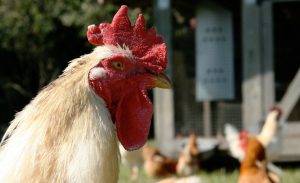As many people prepare to purchase poultry for the spring, health of the flock is important from the start. Making sure that you are properly zoned in your county for poultry ownership is step #1. Finding out later that your poultry will have to find a new home can have negative consequences on your flock’s health.
Priority #1-Nutrition
Your best “defense” for poultry health is a good “offense” in poultry nutrition. Livestock are better able to defend themselves from health challeng

es when they are in an optimal nutrition status. Feeding poultry a “complete feed” (one that supplies all of their energy, protein, mineral and vitamin requirements) is ideal. Feed and water should be kept clean and fresh. Feed and water containers should be cleaned frequently.
Priority #2-Biosecurity
Just as we should not be around sick people, poultry should not either. If you visit another poultry flock, practice biosecurity measures. This means cleaning shoes and clothing before entering your flock’s living area if you have been somewhere else that houses poultry. In addition to disease, we can expose poultry to internal and external parasites by bringing in outside birds to the flock. Always isolate new chickens for 30 days before introducing them to the flock. Your chickens can get mites from non-poultry birds, but these can be controlled with a good health plan. (Request your Poultry Health Packet; see link at the bottom of the post).

Priority #3-Developing a Health Plan
Keeping your chickens free of internal and external parasites will greatly improve the health status of your birds. Also, knowing some of the warning signs for disease will help you quickly stop damage to your flock. Avian Influenza and exotic Newcastle Disease are two of the most devastating poultry diseases.
Avian Influenza symptoms:
Lack of energy, decreased egg production, soft-shelled or misshapen eggs, swelling and purple coloration of eyelids, comb, wattles, gasping for air, runny nose, sneezing, twisting of head and neck, stumbling, diarrhea, sudden death with no symptoms at all.
Exotic Newcastle Disease symptoms:
Sneezing, gasping for air, runny nose, greenish/watery diarrhea, tremors, drooping wings, complete stiffness, swelling around eyes and neck, sudden death with no symptoms at all
If you think you may have a disease problem, the Florida Department of Agriculture and Consumer Services Bronson Animal Disease Diagnostic Laboratory has many tests available for poultry Bronson Animal Diagnostic Disease Laboratory
Request a Poultry Health packet:
If you would like more information on poultry health, contact Laura Bennett at laurahbennett@ufl.edu to request a packet with information on poultry health that can be emailed to you. This packet includes information on internal parasites, external parasites, and general poultry health.
 0
0
